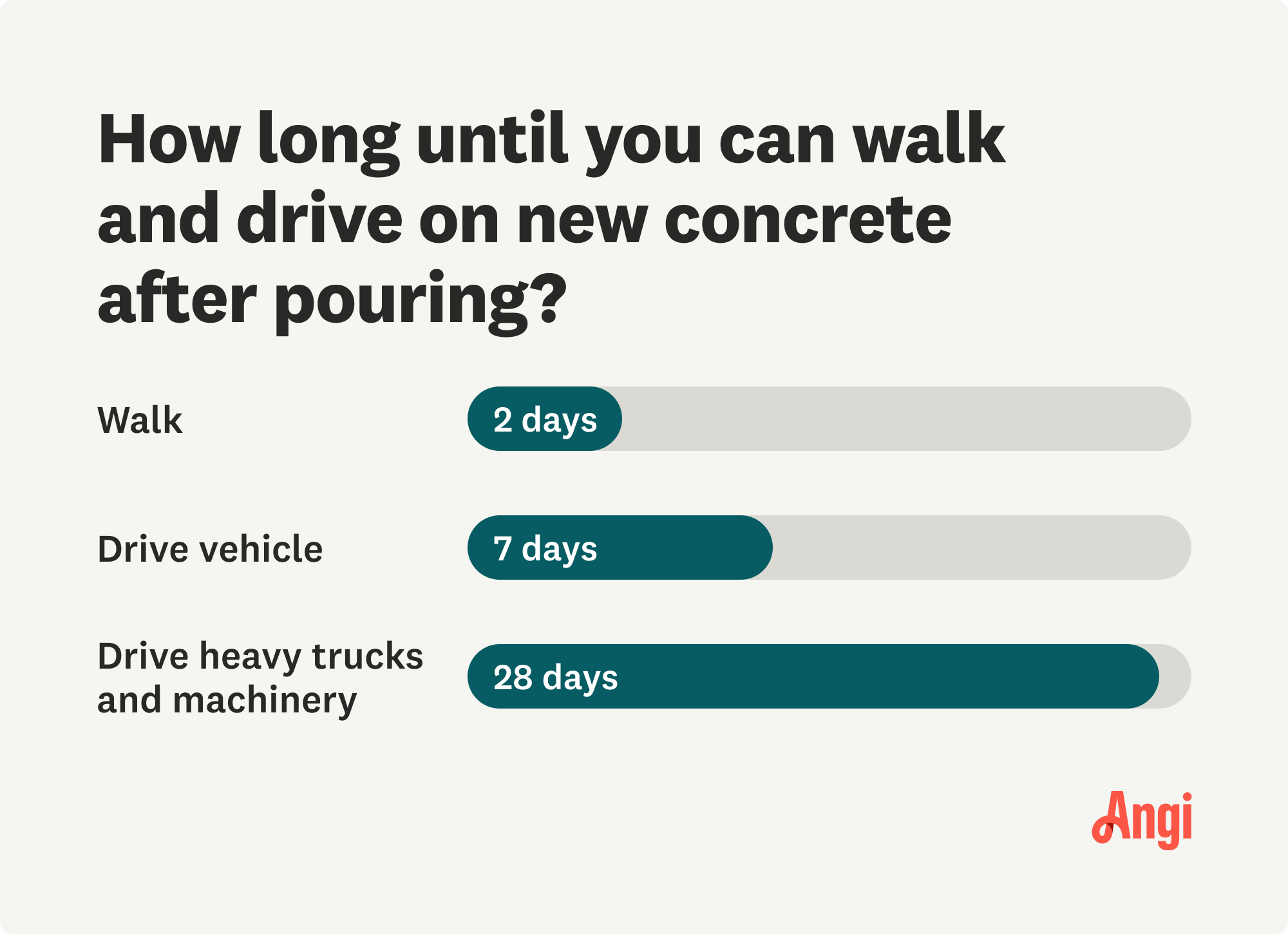
Between the endless customizations and decades of strength, the cost of a concrete driveway may be worth the investment. Let's break down your bottom line.
Handprints in freshly poured concrete are cute, but tire tracks are a different story


You can drive on concrete after seven days.
You can walk on concrete after 48 hours.
You can drive heavy trucks and machinery on concrete after 28 days.
Driving or walking on concrete too early can reduce its strength and appearance.
Hire a concrete pro to ensure your concrete is durable, level, and uniform.
A concrete driveway can add beautiful curb appeal to the front of your home and can last up to 50 years when installed properly. One aspect to consider when choosing between asphalt and concrete driveways is how long you must wait before driving on a concrete driveway after pouring it. Keep reading to learn how long before you can drive on concrete.
Concrete drying occurs when excess water in a concrete mixture evaporates. It takes 24 to 48 hours for the concrete to dry.
Concrete curing is a chemical reaction caused by mixing cement and water, which ensures its strength and durability. It takes about seven days for concrete to partially cure and up to 28 days to fully cure. Curing is more important when determining when to drive on a concrete driveway.
Concrete needs to cure in order to maintain its strength and durability. Improper curing could lead to brittle and porous concrete. A masonry contractor will have the knowledge and skills to know how long your project needs to cure.

You can drive on concrete after seven days with a passenger vehicle. The main surface of the concrete driveway is cured enough to hold a vehicle, but be careful around the driveway's edges. The edges can take up to one month to fully cure. Concrete is the most vulnerable in the first 48 hours after it is poured. Ensure the area is blocked off with warning tape so vehicles, people, and pets stay off the surface.
After 30 days, the concrete will harden entirely and reach full strength. Even so, it’s always best to avoid driving heavy trucks and commercial vehicles on residential driveways. The concrete mix for residential driveways is not designed for the load of a large vehicle.

You can walk on new concrete after two days. However, use caution. Do not slide or twist around as you move because the concrete is still setting. Be especially careful around the edges of the freshly poured concrete sidewalk or driveway, as the edges take longer to cure than the rest of the surface.
Also, do not use bicycles or skateboards on a freshly poured concrete driveway until vehicles are allowed on the surface, as weight is concentrated in small areas and can leave imprints on a concrete surface.
Exactly how long concrete takes to cure depends on different factors. Here are some of the main factors that can impact concrete curing time:
The type of mix: Because there are accelerated curing mixes available, the type of mix can be a factor in curing time. A fast-curing concrete mix will obviously take less time than the average to cure.
Temperature: Weather conditions and temperature can affect the curing time, as the colder the temperature, the quicker the concrete cures.
Mix proportions: Altering the proportions of the concrete curing mix can increase the speed of curing.
If you drive on concrete before it at least partially cures, its structural integrity, durability, and appearance suffers. You can leave permanent tire imprints on your concrete, but worse, it can lead to cracking and reduced strength.
It’s best to wait seven days before driving on fresh concrete and 28 days before putting heavy trucks and machinery on your new concrete.
If you’re pressed for time, there are a few ways you can speed up the curing process. You can use slightly warmer water in your concrete mix, increase the temperature of the surrounding environment, and use fans and dehumidifiers to circulate and remove moisture from the air. You can also add calcium chloride into the concrete mix before pouring.

Most homeowners leave all concrete projects to a local concrete driveway contractor. Working with concrete is a complex process. You must first know the correct mix, then install the concrete per the manufacturer's recommendations. You also need to cure the concrete properly and monitor the temperature. Otherwise, you risk a cracked driveway or end up with one that doesn’t drain properly or last as long.
The cost of a concrete driveway installed by a pro ranges from $2,340 to $7,500, or between $4 and $15 per square foot. If you install the driveway yourself, you will save on labor costs of about $2 to $3 per square foot.
From average costs to expert advice, get all the answers you need to get your job done.

Between the endless customizations and decades of strength, the cost of a concrete driveway may be worth the investment. Let's break down your bottom line.

Whether you’re planning on putting in a concrete driveway, patio, or staircase, use this concrete delivery cost guide to get an accurate estimate.
Need to breathe new life into your exterior stoop? Use this guide on concrete step repair cost to see the price of a professional repair.

Learn about the best driveway materials, such as concrete, pavers, and turf, the prices for each, and the factors you should consider before committing to one.

Concrete is a durable material, but how you install it affects longevity. Learn about dry pour concrete vs. wet pour and which is best for your project.

A concrete driveway can add value to your home. Learn what factors influence your return on investment (ROI) for a new concrete driveway